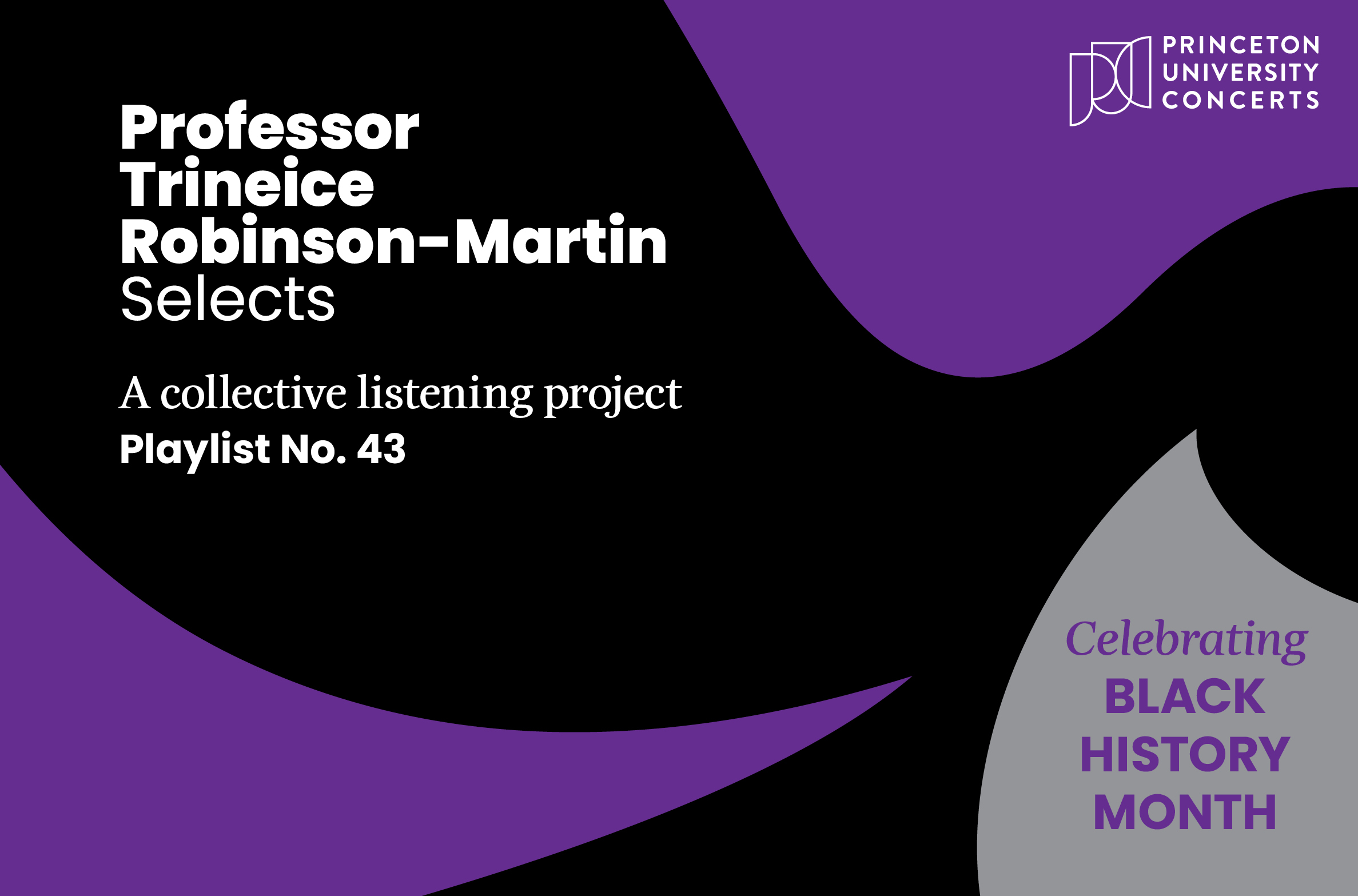Welcome to our 2023-2024 season!
Collective Listening Project
Professor Trineice Robinson-Martin Selects
Playlist No. 43
About the Playlist
February 4, 2021

As we reach the eleventh month of our Collective Listening Project, we hope that this initiative continues to provide a meaningful digital space in which to listen to one another and in which to explore our ever-deepening connection to music within our everyday lives. Department of Music performance faculty member Dr. Trineice Robinson-Martin realizes this intention in this week’s playlist, curated in celebration of Black History Month.
TAKE A STAND: Songs dedicated to or part of the struggle for civil rights and the function of Black music within the Black experience
Music is powerful. It has the power to affect the spirit of all living things. Black American Music maintains a specific cultural and social function that acknowledges, celebrates, and ultimately epitomizes the journey of being Black in America. The songs presented in this playlist have resonated with me on many levels within my own journey. These songs have encouraged me to reflect and continually reassess how the cultural and musical legacy of my ancestors and contemporaries have affected my understanding of who I am as an artist, educator, and scholar. All rooted in the cultural function of Black music, I value how the composers and artists use their platform to inform their listeners, both consciously and subconsciously, of the multidimensions of Black excellence within the struggle.
There could be a paper dedicated to the significance of every song and artist in this playlist.
HALE SMITH Evocation (1966)
Damien Sneed
Hale Smith’s “Evocations” is a short twelve-tone piece for piano which skillfully combines European concert music and jazz with the passion, conviction, and storytelling prevalent in all traditional Black musical forms.
MARGARET BONDS Three Dream Portraits (1959)
Artina McCain and Icy Rene Simpson
1. Minstrel Man
2. Dream Variations
3. I, Too
Composer and pianist Margaret Bonds also combines classical music, jazz, and folk tradition in her setting of three poems by Langston Hughes.
NINA SIMONE Mississippi Goddam (1964)
NINA SIMONE, WELDON IRVINE To Be Young, Gifted and Black (1969)
Aretha Franklin and Gene Orloff
NINA SIMONE, WELDON IRVINE Revolution (Parts 1 and 2) (1969)
Nina Simone
Nina Simone unapologetically uses her platform as a composer and pianist to write songs that speak to the experiences of Black people in America.
ROEBUCK STAPLES Freedom Highway (1965)
The Staple Singers
The Staple Singers composed and performed their song “Freedom Highway” in support of the freedom marchers that marched along a 54-mile highway from Selma, Alabama, to the state capital in Montgomery.
ALMA BAZEL ANDROZZO If I Can Help Somebody (1945)
Mahalia Jackson
Alma Bazel Androzzo’s hymn “If I Can Help Somebody” continues to be a personal favorite of mine and represents an anthem for which I strive. The song has served as a familiar anthem for many community and religious leaders within the Black community, and it is said to be one Martin Luther King Jr. required of Mahalia Jackson to sing regularly.
CLARENCE PAUL, KIM WESTON Operation Breadbasket—Part 1 (1970)
Clarence Paul and The Members
“Operation Breadbasket” was a movement that actually started in the South, contrary to the lyrics saying that it began in Chicago. It was an initiative led by the Southern Christian Leadership Council, which sought to improve economic conditions in the Black communities by boycotting white businesses that did not give Black people fair job opportunities. Sent by Martin Luther King Jr., Jesse Jackson was a key and popular figure in establishing the initiative in Chicago, hence the Chicago reference.
CURTIS MAYFIELD We’re a Winner (1967)
SYLVESTER STEWART Thank You (Falettinme Be Mice Elf Agin) (1969)
Sly and The Family Stone
GIL SCOTT-HERON The Revolution Will Not Be Televised (1970)
Gil Scott-Heron
Curtis Mayfield, Sylvester Stewart (a.k.a. Sly Stone), and Gil Scott-Heron magnify messages of Black pride and encouragement in their songs.
ANTHONY D. J. BRANKER Ballad for Trayvon Martin (2013)
TERENCE BLANCHARD Breathless (2015)
Terence Blanchard and The E-Collective
The playlist concludes with contemporary composers like Princeton University alumnus and the founder of Princeton’s Certificate in Jazz Studies, Dr. Anthony Branker ’80 and Terence Blanchard, continuing the dialogue about racial injustice and the need for justice reform.
CURTIS MAYFIELD Keep on Pushing (1964)
Kirk Whalum
The final selection is a Kirk Whalum arrangement of Mayfield’s “Keep on Pushing,” which leaves us with the message of just that, regardless of the struggle we encounter, “Keep on Pushing.”



